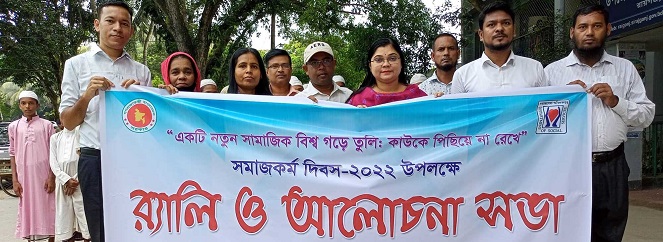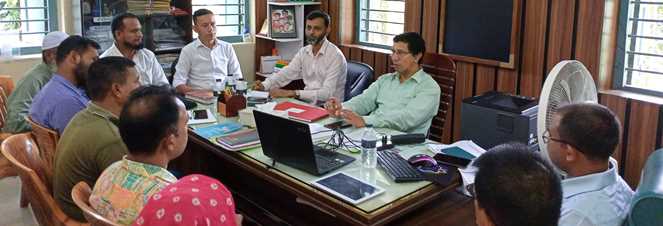-
- About Us
-
Our services
Inspection
-
Higher Offices
Division / District
Ministry / Department
- E-Service
- Gallery
- Contact
- Opinion & Suggestion
-
- About Us
-
Our services
Inspection
-
Higher Offices
Division / District
Ministry / Department
- E-Service
-
Gallery
Photo Gallery
Video Gallery
-
Contact
Office Contact
Communication Map
-
Opinion & Suggestion
opinion and feedback
Rural social service activities
The Rural Social Service (RSS) program implemented by the Department of Social Services under the Ministry of Social Welfare is being conducted with the aim of alleviating the poverty of the poor, helpless, neglected, backward and backward communities living in the rural areas of the country. Palli Samajseva (RSS) interest-free micro-loans as the cradle of micro-credit/poverty alleviation in Bangladesh and a pioneer in the economic emancipation of the marginalized population of the country started a new and colorful history. Under the Rural Social Services (RSS) programme, the first interest-free micro-loans started in Bangladesh. As a result, this program has been established as the cradle and pioneer of Bangladesh microcredit activities. This program started a new and revolutionary history in terms of economic emancipation of marginalized people of Bangladesh.
Under the direction of Father of the Nation Bangabandhu, the Department of Social Services started the 'Rural Social Service Program' in 1974 on an experimental basis in the then 19 Police Stations. In light of its success, this program was expanded to 21 more police stations in 1977. Later expanded rural social service activities in 2nd phase (1980-87) in 103 upazilas, 3rd phase (1987-92) in 120 upazilas, 4th phase (1992-95) in 81 upazilas, 5th phase (1995-2002) in 119 upazilas, 6th phase (2004- 07) In 470 upazilas and currently it is being implemented in all the upazilas of the country. Through this program, the landless people living in the rural areas, living below the poverty line, are organized in various working groups by creating social awareness and their participation in all types of economic development programs of the country is ensured by involving them in productive and income-generating programs by providing interest-free small capital.
purpose
Through this program, creating social awareness among the landless, living below the poverty line and involving them in income-generating programs is ensuring their participation in the overall development of the country.
The upazila executive officer is the president and the upazila social service officer is the member secretary and the concerned departmental officers are being implemented by the 16-member Rural Social Service Implementation Committee (UPIC) at the upazila level.
Implementation progress of Rural Social Service (RSS) activities
First start of operations: 1974 AD
Number of upazilas covered: 492
Total amount of allocation received: 575 crore 33 lakh 66 thousand 282 taka
Total allocation amount as micro credit: 567 crore 87 lakh 36 thousand 980 taka
Amount of principal invested as microcredit: Tk 556 crore 19 lakh 57 thousand
Amount of Principal Amount: 492 crores 21 lakhs 10 thousand taka
Principal Recovery Rate: 91%
Cumulative amount of reinvested money: 1182 crore 52 lakh 60 thousand taka
Cumulative Reinvestment Payback Rate: 90%
Total amount of service charge collected: 141 crore 41 lakh 46 thousand taka
Amount of bank interest received: 38 crore 98 lakh 43 thousand taka
Amount of personal savings of beneficiaries: 15 crore 84 lakh 35 thousand taka
Total number of beneficiaries through microcredit to begin with: 34 lakh 35 thousand families
Number of current borrowers: 9 lakh 68 thousand 276 families
Services:
To mobilize the poor people and bring them into the mainstream of development;
Poverty alleviation and improvement of standard of living;
awareness raising and skill development;
Microloans from a minimum of Tk 5,000 to a maximum of Tk 50,000 per family;
Creation of sustainable organizations (Palli Samajes or Gram Samiti) of the targeted people with the money collected from the service charges and creation of own capital of the Gram Samiti.
Service Recipient:
Residents of selected villages;
Party Member of Rural Social Service Working Group;
Class 'A' (poorest) whose family members have an average annual income of up to Rs.50,000
Average annual household income between Tk 50,001 to Tk 60,000 (poor) 'B' category
Category 'C' with average annual household income above Rs 60,001 (above poverty line)
Other services including 'A' and 'B' category microcredit and other social services except category C interest-free loans;
Those involved in the implementation of the program:
At the central level, the activities branch of the Department of Social Services is responsible for the implementation of this program. Under the leadership of Director (Programs), one Additional Director, one Deputy Director, 1 Assistant Director, 2 Deputy Assistant Directors, 1 Social Service Officer at the headquarters level and 492 Upazila Social Service Officers at the field level are involved in the implementation of these activities.
64 Deputy Directors and 100 Assistant Directors at the district level supervise field level activities and coordinate between field level and headquarters. Upazila Rural Social Service Program Implementation Committee is the implementation authority of the program. Upazila Social Service Officer and Upazila Nirbahi Officer are responsible as Member-Secretary and President respectively of the Program Implementation Committee. Union social workers and training instructors work directly with the beneficiaries at the village level. The field supervisor of the upazila social service office supervises the activities of the union social workers and training instructors and assists the social service officer in the overall coordination of the activities.
Service Center:
492 upazila social service offices;
Functions:
village elections;
village survey;
Organizing and organizing the target poor population;
Formation of village/mahalla committee;
provide literacy;
Encouraging various social issues;
(Family planning,
Planning and Implementation: Cabinet Division, A2I, BCC, DoICT and BASIS








